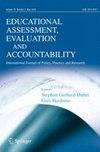学校关闭政策与学生阅读成绩:各国的证据
IF 1.6
3区 教育学
Q1 EDUCATION & EDUCATIONAL RESEARCH
Educational Assessment Evaluation and Accountability
Pub Date : 2023-09-30
DOI:10.1007/s11092-023-09415-4
引用次数: 1
摘要
随着教育系统决定关闭学校以遏制病毒的传播,COVID-19大流行扰乱了全球教育。学校关闭的时间在国际上差别很大。在本研究中,我们使用国际上不同的学校关闭政策来检验学校关闭对学生成绩的影响。具体而言,我们使用了来自29个国家的30多万名学生的代表性趋势数据,以检验学校停课时间的长短是否与COVID-19爆发前后学生成绩的变化有关。我们观察到学校关闭对学生阅读成绩有显著的负面影响。即使在控制了传染病严重程度的措施(如感染率、疫苗接种政策和封锁严格程度)之后,这种学校关闭效应仍然存在。估计的影响表明,一年的学校关闭大致相当于半个多学年的学习损失。这种影响在社会经济条件较差的学生和没有家用电脑的学生身上更为明显。本文章由计算机程序翻译,如有差异,请以英文原文为准。

School closure policies and student reading achievement: evidence across countries
Abstract The COVID-19 pandemic disrupted education worldwide as educational systems made the decision to close schools to contain the spread of the virus. The duration of school closures varied greatly internationally. In this study, we use international variation in school closure policies to examine the effects of school closures on student achievement. Specifically, we use representative trend data from more than 300,000 students in 29 countries to examine whether the length of school closures is related to changes in student achievement before and after the outbreak of COVID-19. We observe a significant and substantial negative effect of school closures on student reading achievement. This school closure effect remains even after controlling for measures of pandemic severity such as infection rates, vaccination policies, and a measure of lockdown stringency. The estimated effect implies that a year of school closures corresponds roughly to the loss of a little more than half a school year of learning. This effect is even more pronounced for socioeconomically disadvantaged students and those without home computer access.
求助全文
通过发布文献求助,成功后即可免费获取论文全文。
去求助
来源期刊

Educational Assessment Evaluation and Accountability
EDUCATION & EDUCATIONAL RESEARCH-
CiteScore
9.40
自引率
2.60%
发文量
23
期刊介绍:
The main objective of this international journal is to advance knowledge and dissemination of research on and about assessment, evaluation and accountability of all kinds and on various levels as well as in all fields of education. The journal provides readers with an understanding of the rich contextual nature of evaluation, assessment and accountability in education. The journal is theory-oriented and methodology-based and seeks to connect research, policy making and practice. The journal publishes outstanding empirical works, peer-reviewed by eminent scholars around the world.Aims and Scope in more detail: The main objective of this international journal is to advance knowledge and dissemination of research on and about evaluation, assessment and accountability: - of all kinds (e.g. person, programme, organisation), - on various levels (state, regional, local), - in all fields of education (primary, secondary, higher education/tertiary, as well as non-school sector) and across all different life phases (e.g. adult education/andragogy/Human Resource Management/professional development).The journal provides readers with an understanding of the rich contextual nature of evaluation, assessment and accountability in education. The journal is theory-oriented and methodology-based and seeks to connect research, policy making and practice. Therefore, the journal explores and discusses: - theories of evaluation, assessment and accountability, - function, role, aims and purpose of evaluation, assessment and accountability, - impact of evaluation, assessment and accountability, - methodology, design and methods of evaluation, assessment and accountability, - principles, standards and quality of evaluation, assessment and accountability, - issues of planning, coordinating, conducting, reporting of evaluation, assessment and accountability.The journal also covers the quality of different instruments or procedures or approaches which are used for evaluation, assessment and accountability.The journal only includes research findings from evaluation, assessment and accountability, if the design or approach of it is meta-reflected in the article.The journal publishes outstanding empirical works, peer-reviewed by eminent scholars around the world.
 求助内容:
求助内容: 应助结果提醒方式:
应助结果提醒方式:


